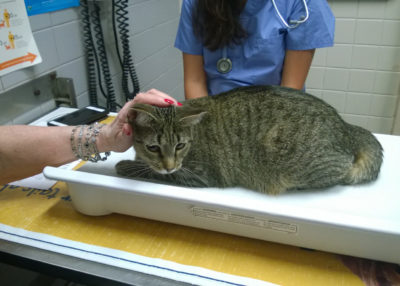Pancreatitis in cats is one of the most common diseases in cats and often goes unnoticed. In fact, unlike dogs, it does not usually develop acutely, if not chronically, because since clinical manifestations do not appear suddenly, they are more difficult to detect.
In addition, more representative symptoms, such as weight loss and lack of appetite, are common in other feline diseases, making diagnosis difficult. For more information about pancreatitis in cats, symptoms and treatment, continue reading this Animal Expert article.
- Feline pancreatitis is an inflammation of the pancreas.
- A gland near the small intestine (in fact.
- Partially attached to it) and that performs various functions in the body of animals and humans.
- If.
- On the one hand.
- It has an endocrine function.
- Producing hormones such as insulin.
- On the other hand.
- It has an exocrine function as it also produces substances that help digest food.
Unfortunately, the cause of feline pancreatitis is generally not easy to identify, although it may be related to certain toxins present in many insecticides and infectious agents such as batteries, viruses such as feline infectious peritonitis or parasites, such as Toxoplasma.
The causes of pancreatitis in cats may also be related to a high-fat diet, due to allergic phenomena or trauma in the region.
In cats, the most common is pancreatitis derived from exocrine pancreatic insufficiency, i.e. the gland is not able to properly perform its digestive hormone production work. In this chaos, symptoms of feline pancreatitis are weight loss, loss of appetite and, less frequently, diarrhea and vomiting.
Although there is an acute form, pancreatitis in cats is usually a chronic process and these symptoms may not be very severe and can go unnoticed. In some cases, recurrent vomiting may be confused with causes related to the ingestion of hairballs, which are very common in cats. However, cats with feline pancreatitis may have inflammation of the small intestine and liver, in which case they detect jaundice.
To diagnose pancreatitis in cats, the symptoms mentioned above, duration of symptoms and possible causes should be investigated by interviewing the animal’s guardian. The animal should then be physically examined with an emphasis on cat hydration, body condition, abdominal pain and the color of mucous membranes, which are yellow in case of jaundice.
A blood test will be performed to confirm the diagnosis that will include specific elements to detect feline pancreatitis. Blood tests are also helpful in understanding the overall health of your cat and other organs that may be affected in the case of pancreatitis in cats, such as the liver.
Ultrasound is much more useful than x-rays, in these cases it can reveal inflammation of the cat’s pancreas, confirming the diagnosis.
In acute cases, as well as in the most severe cases, the first thing is to stabilize the patient. Since one of the functions of the pancreas is to help in the digestion of food. In some cases, you may think that fasting is a proper practice, but this is not true. In cats, prolonged fasting can cause serious liver problems, and patients with this condition usually have a low body condition, so a dietary restriction can lead to a serious risk of malnutrition. The truth is that, in cases of acute pancreatitis, much more common in dogs than in cats, it is necessary to fast solids, accompanied by the administration of intravenous serum.
Privar água dos gatos com pancreatite é um erro imperdoável que pode acabar com a vida do animal. Se o gato vomita ao beber, você deve oferecer antieméticos para evitar ou utilizar soro intravenoso. Em qualquer caso, a dieta para os gatos com pancreatite deve ser de fácil digestão, oferecendo alimentos úmidos especificamente indicados que podem ser administrados, inclusive, mediante sonda. Também podem proporcionar analgésicos opiáceos para reduzir a dor do animal.
After these first moments, or in cats with chronic pancreatitis where symptoms do not frighten the life of the cat in the short term, the treatment of feline pancreatitis is based on diet. This, should be easy to digest and low in fat, there are commercial diets formulated especially for cats with feline pancreatitis. Some vitamin supplements are also recommended, and vitamin B12-rich products are particularly helpful.
This article is for informational purposes only, in Animal Expert.com.br we cannot prescribe veterinary treatments or make any kind of diagnosis. We suggest that you take your pet to the veterinarian in case of any type of condition or discomfort.
If you would like to read articles similar to, we recommend that you visit our Other Health Problems section.

